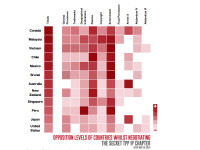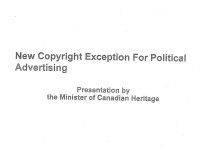Bill S-4, the government’s Digital Privacy Act, was sent for review to the Industry Committee yesterday. The committee review, which comes before second reading, represents what is likely to be the last opportunity to fix a bill that was supposed to be a good news story for the government but has caused serious concern within the Canadian privacy community. While there are several concerns (I raised them in my appearance before the Senate committee that first studied the bill), the chief one involves the potential expansion of voluntary disclosure of personal information without consent or court oversight. Bill S-4 proposes that:
“an organization may disclose personal information without the knowledge or consent of the individual… if the disclosure is made to another organization and is reasonable for the purposes of investigating a breach of an agreement or a contravention of the laws of Canada or a province that has been, is being or is about to be committed and it is reasonable to expect that disclosure with the knowledge or consent of the individual would compromise the investigation;
Translate the legalese and you find that organizations will be permitted to disclose personal information without consent (and without a court order) to any organization that is investigating a contractual breach or possible violation of any law. This applies both past breaches or violations as well as potential future violations. Moreover, the disclosure occurs in secret without the knowledge of the affected person (who therefore cannot challenge the disclosure since they are not aware it is happening).
The government is clearly aware that this is a major concern as it attempted to answer the critics during debate over Bill S-4 in the House of Commons yesterday. Unfortunately, the responses were incredibly weak. I’ve identified at least six responses from government sources below.











